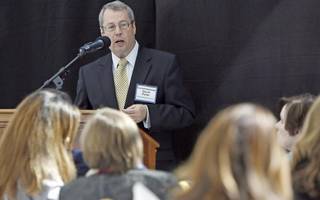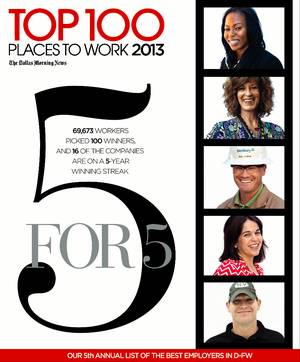David Porter can be an easy man to miss. With a neat part to his hair and an understated, monotone speaking style, he resembles less a politician than an accountant — which is what he happens to be.
But there’s no missing the Texas railroad commissioner’s message. Over the last few months, Porter has made controversial statements on lax security along the U.S.-Mexico border and on Russia manipulating the international gas market, raising both his profile and that of the state’s top oil and gas agency.
In August, Porter, a Republican, wrote a letter to U.S. Customs and Border Protection questioning what steps it was taking to stop terrorists from the Islamic State and al-Qaeda from crossing the border into the United States. Citing an interview that a former CIA officer and security consultant gave on the radio program The Laura Ingraham Show, Porter said that the Mexican drug cartels were in “conversations.”
“Last year Yemeni terrorists attacked major oil pipelines as a tactic in their war against the West. … I shudder to think what these terrorists would do to the U.S. when they are willing to do this to their own country,” he wrote.
Throughout its more than 120-year history, the Texas Railroad Commission has largely set drilling rules and settled disputes between adjoining royalty owners over whose oil is whose.
In an interview, Porter, 58, said the agency has a duty to address all issues affecting the state’s oil and gas industry, whether in Midland or Moscow. As to the Islamic State allegation, he said he had been following media reports about the border and felt compelled to step in for the sake of Railroad Commission employees who inspect pipelines near the border.
“It wasn’t based on any definitive information,” he said. “There were a lot of reports in the media about the potential for [Islamic State] terrorists going through there. We were just asking questions.”
The August news release got picked up at media outlets around Texas. But the claims have been ridiculed in some circles of the energy industry as political grandstanding.
“I’ve seen these claims, but I don’t give them much merit. And when I go to Houston and talk to the multinationals, I don’t hear that linkage between security in Mexico and the terrorist organizations,” said Jorge Piñon, a former top executive at Amoco and BP, now director of the Latin America and Caribbean Energy Program at the University of Texas.
Porter, a native of Washington state who moved to Texas in 1981, was a virtual unknown in Austin political circles until he won the railroad commissioner’s seat in 2010.
A graduate of Harding University, a Christian college in Arkansas, Porter moved to Midland to open an accounting practice. He found steady work managing the books of the city’s oil and gas industry. On the side, he worked on GOP campaigns, staying in the background as a volunteer.
Workhorse with a kick
“David is a workhorse, not a show horse. He’s not always trying to get his name in the paper and doesn’t have to be the guy out front,” said Jeff Norwood, a former Midland County judge and owner of Austin consulting firm Anthem Media.
Porter’s profile began to rise in 2006, when he served as treasurer for the Texas Republican Legislative Campaign Committee. A now-dormant conservative organization that targeted moderate Republicans in the Texas Legislature, it spent $2.7 million on primary campaigns in the first half of 2006. In one case, a GOP legislator from East Texas filed a defamation lawsuit claiming his voting record had been misrepresented. The case was ultimately settled.
Three years later, Porter decided to take on Railroad Commissioner Victor Carrillo, whom Gov. Rick Perry had appointed to the post. No one gave Porter much of a chance. He was vastly outspent by Carrillo and had little name recognition. But on primary day 2010, Porter won by more than 20 percentage points — something Carrillo attributed to voter bias against Hispanics.
Porter argued that his victory was the result of the Railroad Commission allowing itself to be painted as ineffective by environmentalists during the natural gas boom in the Barnett Shale. And he pointed to the recent vote by Denton to institute a fracking ban as evidence.
“The commission needed better leadership,” he said. “I talked about pushing back against the EPA. Now everybody talks about it, but at the time I was one of the very first.”
To begin his tenure, Porter focused on bringing together local officials and oil and gas drillers in the Eagle Ford Shale to address how truck traffic was tearing up local roads. He has been out front in promoting natural gas, of which there is a glut in the United States, as a transportation fuel.
Sudden attention
Along the way he has won praise from local officials and industry. But as is often the case with railroad commissioners, he did not generate much public attention. Until this summer.
The letter to homeland security was followed by another in October to Secretary of State John Kerry. Porter questioned what action the government was taking to address “Russian President Vladimir Putin’s funding efforts to damage the U.S. natural gas industry in order to increase the global market share of his state-run company, Gazprom.”
Porter alleged that Gazprom was behind the banning of hydraulic fracturing in Europe and was trying to do the same here through the funding of the anti-drilling documentary Gasland. The Los Angeles company that put out the movie denied any Russian involvement, but the story quickly spread across Twitter and Facebook.
“He’s tapping into this fear in the Oil Patch now that the price of oil has fallen,” said Cal Jillson, a political science professor at Southern Methodist University. “The comments play quite well with GOP primary voters. That vote is very concerned with the border. In their minds, if 11-year-old Guatemalans can come across, then so can [Islamic State] terrorists.”
Four years into his term, speculation is already mounting whether Porter is using the Railroad Commission seat to prove his conservative bona fides ahead of a run at a higher office. Politicians are rarely forthcoming about their aspirations while still in office. True to form, Porter said he was only thinking about his re-election campaign in two years.
“I certainly don’t expect a long political career. But I’m not going to rule out running for another office,” he said.
On Twitter:
@osborneja














To post a comment, log into your chosen social network and then add your comment below. Your comments are subject to our Terms of Service and the privacy policy and terms of service of your social network. If you do not want to comment with a social network, please consider writing a letter to the editor.